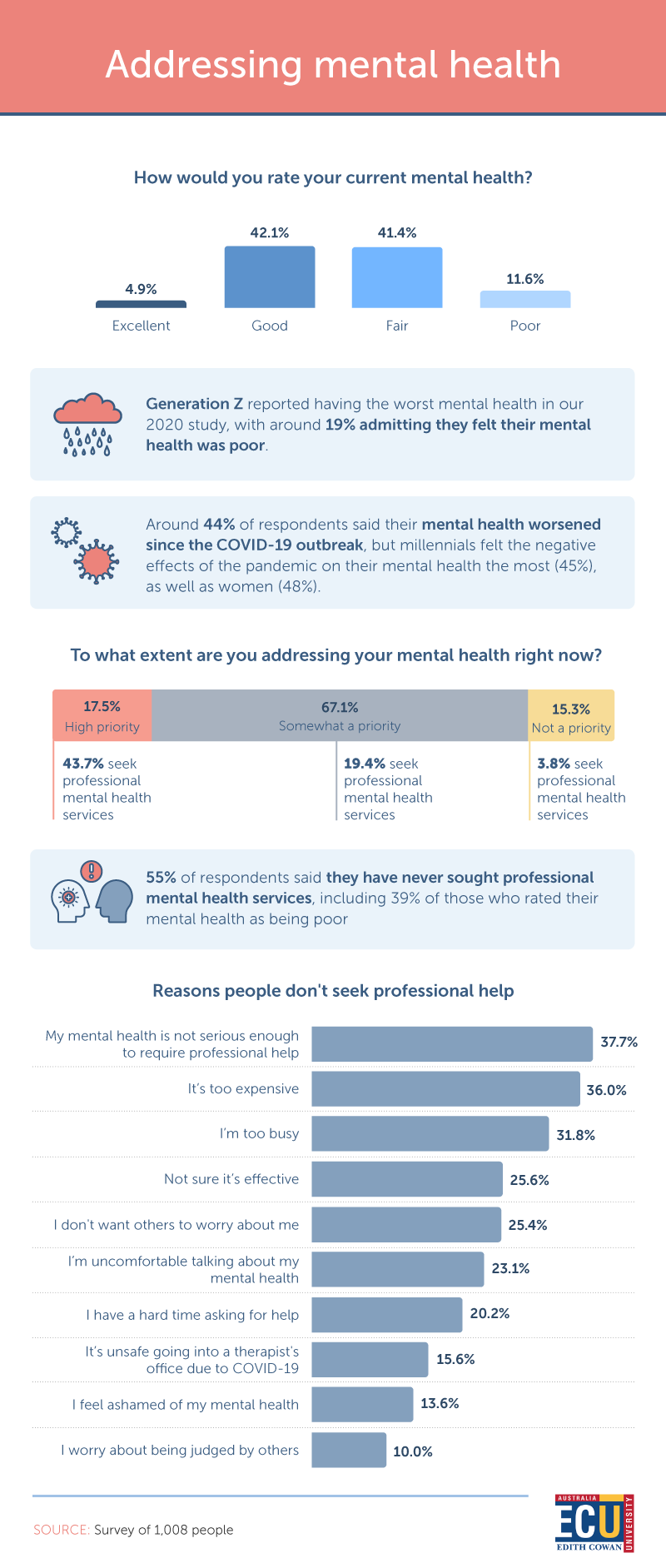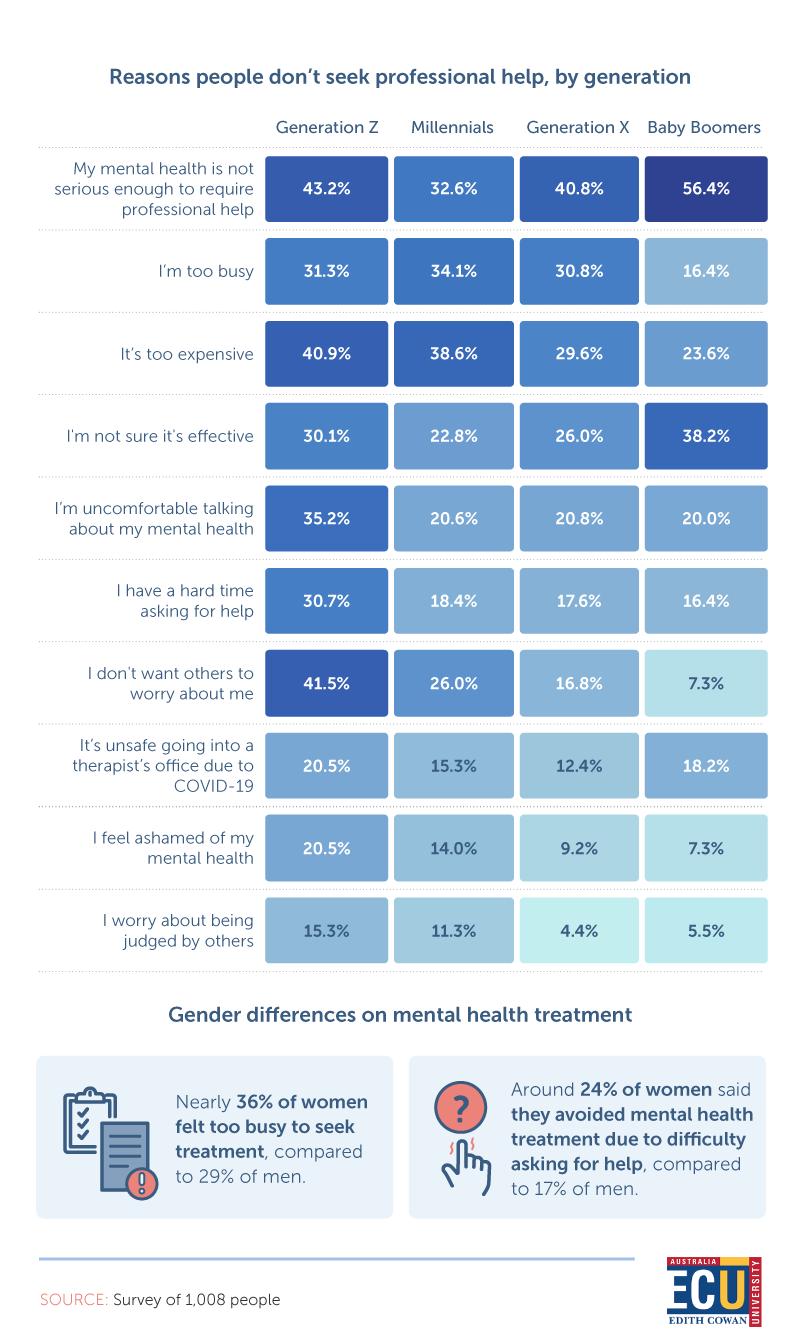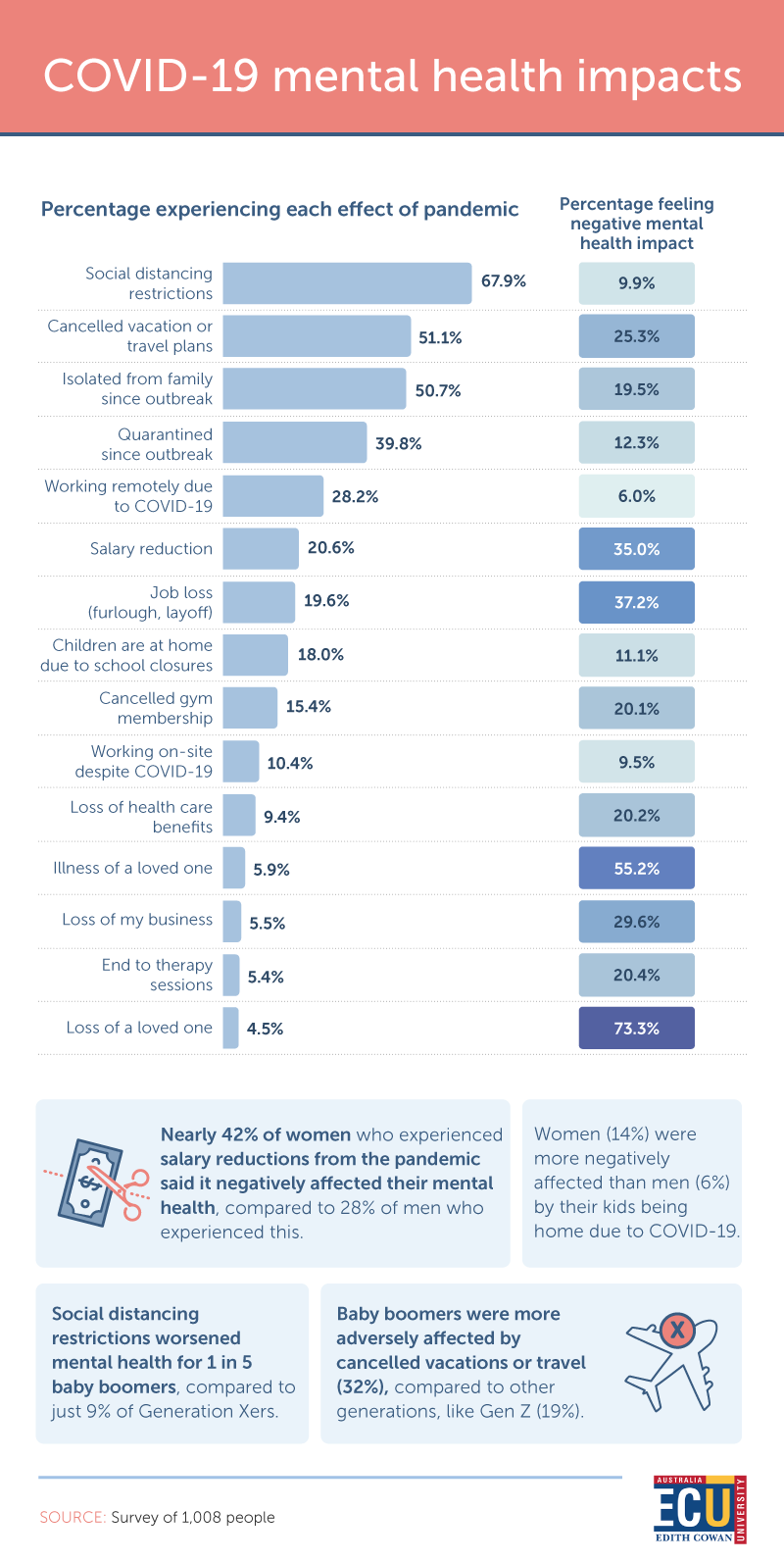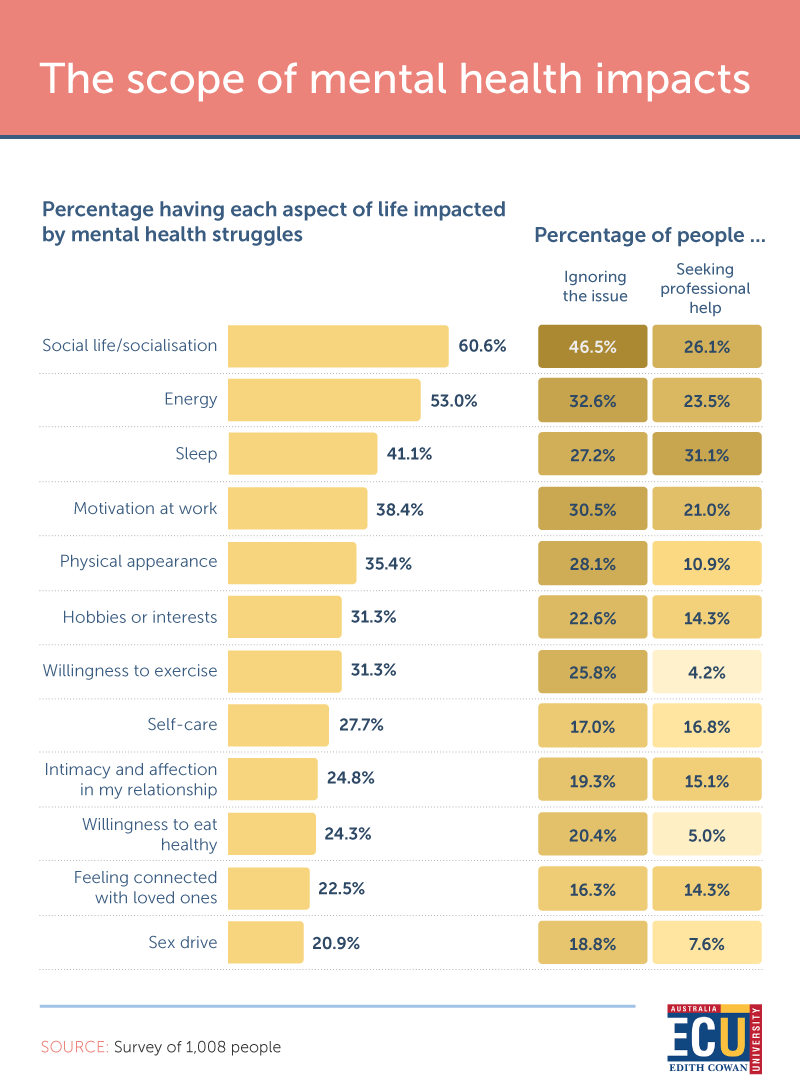
Ignoring Mental Health Issues
As the world experiences an unprecedented health crisis, how is our collective mental health faring? Just last year, the World Happiness Report, a global survey that ranks citizen happiness in over 150 countries, showed the United States reporting record lows in happiness. Since then, the world has experienced a global pandemic, economic collapse and new life routines.
Mental health is now on the forefront of public health concerns, but seeking professional help and therapy may not be high on our priority list as we adjust to these new realities. In order to examine the issue of mental health for our study, we wanted to see how common it was for people to simply ignore mental health issues during this time.
We surveyed over 1,000 people from the U.S., Europe and Australia in order to explore their priorities when it came to mental health and how their mental health related to the effects of COVID-19. If you're curious to see how your own approach to mental health stacks up against others experiencing similar hardships, this data is for you.
It’s clear the demand for counselling skills is growing. If you are passionate about making a difference to individuals, families and communities, ECU’s online Master of Counselling will give you tools that you can apply to a range of settings. To learn more, call us on 1300 707 760 to speak with one of our Student Enrolment Advisors.
Top of mind
Our study showed that few people would describe their mental health as ‘excellent' these days. Despite the fact that around half of all people reported their mental health as less than ‘good', seeking professional treatment was not a common practice. Even 39% of people with ‘poor' mental health didn't receive any professional help. The main reason? They didn't think their problems were serious enough.

The extent of mental health problems can be hard to identify without any training. The Australian government, created a resource to help the public self-identify mental health struggles during the COVID-19 pandemic. They are also providing Medicare-subsidised therapy sessions for people subjected to further pandemic restrictions and are encouraging the public to seek professional help before they think they need it.
But our study showed this preventative approach to mental health may not be financially feasible for many, and could be a reason why people skip therapy. More than a third of respondents (36%) said therapy was too expensive. Though therapy often can be expensive, the pandemic may actually improve costs and access. With more businesses and services going remote, many doctors unveiled more affordable virtual options for therapy and general health consultations.
If cost wasn't a barrier, social attitudes towards mental health were, according to those respondents who felt ashamed, guilty or self-conscious about the perception of others. Thankfully, seeking mental health care has become much less stigmatised recently, especially with generations such as Millennials, nicknamed the therapy generation, embracing the practice.
As our study shows, Millennials were less likely to be deterred from seeking help, while Generation Z, who also reported the highest percentage of "poor mental health," reported more hurdles – beyond cost alone – which included feelings of shame, judgment and worry that were not nearly as prevalent in other generations.

Moments of impact
The effects of the pandemic have touched all of our lives, and some have been affected more profoundly than others.
Content warning: This next portion of our study dives into many of these pandemic-related losses, as well as how it affected the mental health of those experiencing them.

The loss of a loved one during the pandemic had the most severe impact on mental health, followed by illness of a loved one and job loss. With millions of global citizens touched by illness and death due to the pandemic, organisations such as the United Nations are underscoring the impact this will have on mental health down the line.
Job loss was a much more common source of emotional turmoil; one in five participants had lost their jobs, 21% saw a salary reduction and 9% lost their health care benefits.
Women were more negatively impacted by aspects of the pandemic than men. Women were more affected by their children being home during the pandemic than men were. Studies show women are more likely to help with home-schooling and child care now that children are quarantined at home. For many, this could mean balancing a new way of working at home as well as managing childcare and education.
Effects of help
Mental health's impact on our lives is far-ranging. Many of the individuals we surveyed said their mental health issues impacted their social life or ability to socialise. Another concern is that so few people actually seek professional help to manage these issues' impact on aspects of daily life like energy level, sleep and work.
We explored the areas of life that people felt their mental health impacted most, as well as the percentage of people seeking professional help or simply ignoring the issue.

A social life, and socialisation in general, were the first areas of impact for a person's declining mental health. This mental health impact was the most likely to be ignored by most, with only around 26% of people seeking professional help to address a declining desire to be social based on mental health struggles.
As has been proven time and again, both quality and quantity of sleep are extremely important to a person's mental health. Conversely, it's easy to see why struggles with mental health can affect sleep, as those surveyed reported negative impacts on their sleep quality as well as energy levels. Mental health's impact on sleep was the only area in which people were more willing to seek professional help rather than ignore the issue, underscoring just how important sleep has become as a health priority today.
Looking out for your mental health
As our study concluded, mental health is not just a personal struggle, but a commonly shared health concern, especially during this unprecedented time of hardship. Though we've come a long way as a society to break down the stigma of mental health, many still struggle to seek professional help, often feeling that their issues may be too small to warrant the investment of time or cost. But our study shows mental health impact can extend to many areas of life, from our motivation at work to our connection to loved ones. If you are struggling with any of these, you know how hard it can be to overcome it alone.
Thankfully there are plenty of resources all over the world, including in Australia. Getting help doesn't necessarily have to look a certain way, it's just important to take the first step, be it starting a personal mental health practice or seeking professional consultation.
If you or someone you know needs support, you can find help from the following services:
- Lifeline on 13 11 14
- MensLine Australia on 1300 789 978
- Suicide Call Back Service on 1300 659 467
- Beyond Blue on 1300 224 636
- Headspace on 1800 650 890
- ReachOut
Methodology and Limitations
We surveyed 1,008 people from the US, Europe and Australia in order to explore their mental health and methods toward treatment. In order to dive into mental health issues experienced during the COVID-19 outbreak, we asked respondents to rate their current level of mental health from excellent to poor, and excluded respondents who rated their mental health as excellent.
Respondents were asked to indicate reasons why they forgo professional help, as well as the experiences they've had during the pandemic. We then asked respondents to rate how each of these COVID-19-specific events affected their mental health on a five-point scale ranging from ‘very negatively affected mental health' to ‘no impact', to ‘very positively affected mental health'.
Ages of survey respondents ranged from 18 to 71, with an average age of 34 and a standard deviation of 11 years. Around 17% of respondents identified as Generation Z, 53% as Millennials, 24% as Generation X, and 6% as Baby Boomers. Our respondents were 52% women and 48% men. Survey data have certain limitations related to self-reporting. These limitations include telescoping, exaggeration and selective memory. We didn't weight our data or statistically test our hypotheses. This was a purely exploratory project that examines mental health.
Fair Use Statement
Knowledge is power and is especially important for mental health. When facing a pandemic, patients need all the knowledge and power they can get. Feel free to share the data in this article with someone you know who may need it, but be sure your purposes are noncommercial and that you link back to this page.



